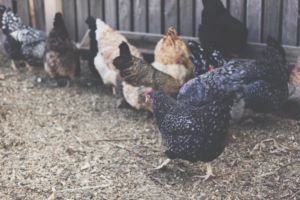 There are many different kinds of bedding for the floors of backyard chicken coops, runs, and enclosures. Chickens love to walk around on the earth to scratch around and feel the real ground beneath their feet. River sand offers these luxuries but it also helps deter insects, smells better, and can be healthier for your flock than other beddings that can harbor disease and smell.
There are many different kinds of bedding for the floors of backyard chicken coops, runs, and enclosures. Chickens love to walk around on the earth to scratch around and feel the real ground beneath their feet. River sand offers these luxuries but it also helps deter insects, smells better, and can be healthier for your flock than other beddings that can harbor disease and smell.
Pine bark, shavings, sawdust, and wood chips have all been tried. They are easy to get but they don’t have the necessary qualities for a good bedding for poultry. A proper bedding should keep moisture down, avoid smells, and be easy to maintain. Pine bark, wood chips, and sawdust all cake and float into a sticky mess when they get wet. Chicken poop sticks to it and bacteria proliferate into a wet, smelly, sticky mess.
Sand makes an amazing chicken floor bedding. Sand is cheap and readily available. Not just any sand will work functionally. Large grained natural sand like river sand is best for chicken coop bedding. Natural river sand has various sizes of grain and because of its natural origin, there are no sharp edges and massive amounts of dust. Most suppliers offer washed or rinsed river sand for construction and other similar uses.
Use the Correct Type of Sand

Play sand is not suitable for chicken coop bedding. Play sand is too fine and usually is from crushed rock. Being crushed from larger grain or rocks makes too much dust. Overall play sand is too small in grain size, has sharp edges, and packs tightly when walked on or wet. Play sand is often made from crushed quartz and fine dust from it is high in silica which can create health issues for birds and humans alike. Silicosis can be caused by breathing in too much silica from play sand dust.
River sand is inert and organic for the most part. As it does not absorb water moisture drains through and causes chicken droppings to dry out. Dry chicken manure doesn’t smell anywhere nearly as bad as wet chicken poop. Since it doesn’t absorb moisture in its grain there is very little surface area for bacteria to live in and grow. As long as chicken manure is scooped out regularly smell can easily be controlled. There will be fewer flies and other nuisance insects in the coop as well.
Sand Can Help Avoid Wet Messy Coop and Runs

Sand that has mixed particle sizes such as river sand and builders sand has good drainage. This is very useful and helpful in wet climates as it allows water to run off easily. Since water drains through the sand quickly it does not create mud puddles and wet muck like compacted wood shavings and sawdust can.
Even though sand makes for excellent drainage the coop should be placed away from low spots and run off areas. if this cannot be avoided build up the coop or run floor until it is higher than the water is.
Sand is a Healthy Alternative to Organic Based Beddings
Sand is also healthier than wood chips, sawdust, and shavings. Coccidiosis requires warm and moist environments to produce spores, something that organic material like pine bark and wood chips create. Sand does not give coccidiosis a breeding ground because it doesn’t retain heat and dries much faster because it drains water away. Chickens are more able to build up a natural immunity to coccidiosis because there are much lower levels in the sand instead of contracting it from overexposure to contaminated wood chips, sawdust, or shavings.
Sand is more resistant to microbes than wood products. Chicks tend to be more healthy on sand because of this. If chicks ingest small amounts of sand there are no issues as they need it for their crop to digest food. If chicks eat sawdust or bark they can get impacted crop which can be fatal as they cannot break it down in their gizzard and it becomes trapped.
When chicks kick sand into waterers sand sinks and doesn’t become a problem. Wood particles that get kicked into waterers tend to float and cover the surface which discourages chicks from drinking water freely. When introducing chick starter use paper towels as flooring in the brooder for a few days then switch to sand.
Where do I get Clean River or Builders’ Sand?
Clean river sand, also called construction or builder’s sand, can be bought by the dump truck load and is often sold by the yard. River sand is available almost anywhere as it is used to mix with cement and as a prefill for construction purposes. Delivery is sometimes included in the cost and sometimes not. Ask your supplier about delivery fees.
How Do I Clean the Sand Bedding Once it is Pooped On?
Cleaning a sand bedding floor is not that difficult at all. Common kitty litter cleaning scoops can aid in picking up chicken droppings. Since sand dries out the chicken manure it will clump slightly and allow easy pick up of the manure. There are even corner scoopers that make getting into corners fast and easy. Flathead shovels with a sift are also available to make large areas quick work or to help those that are squeamish about getting down and dirty with chicken poop.
Enclosed backyard and hobby poultry chicken coops can benefits from sand bedding too. Wooden floors can have a cheap layer of linoleum laid over the wood floor to help protect the wood from decay and smell and to keep sand from sifting between the cracks in the floor if there are any.
Linoleum covering on the floor also makes scooping dried poop out easy with cat litter box cleaning tools. When the annual cleaning is needed, or some other reason to clean the coop thoroughly, it also allows shoveling out the coop quick work. Sand can be rinsed thoroughly and dried in the sun to be reused again. There are also bucket sifters that can be placed on top of a five-gallon bucket to make cleaning sand quick and easy work. Once sifted it can be rinsed and dried.
Another great way to avoid stink and smell is to use dropping boards in your coop. Dropping boards are placed under your roosts where chickens spend the night. These boards catch the poop and dry quickly which makes them easy to clean. The boards will need to be taken out and scraped off weekly but it helps reduce flies and smell. A drywall scraper makes quick work of scraping chicken poop off of dropping boards. Anything you can do to dry out chicken poop efficiently and sanitarily will help reduce odor and flies. Neither of these two is popular with poultry keepers.
Zeolite Can Help Manage Flies and Smell and is Natural
Zeolite is a natural mineral that is formed when volcanic rock and ash have an alkaline reaction to groundwater. Zeolite is safe to use in the chicken coop to help conquer smells and flies. It is 100 percent safe and is used as a feed supplement in hogs and cattle and it won’t harm your chickens or poultry. If poultry eats zeolite it acts like any regular grit would without any harm to the birds. Zeolite can be bought at most places that supply farm products and places that sell feed.
Zeolite can be sprinkled across the foundation of where your sand bedding will be laid. It can also be applied to troubled areas and it will absorb additional moisture from droppings. It controls the ammonia smell from droppings and clumps, making it as easy to scoop out with kitty litter tools as sand does.
You Won’t Regret Going With Sand as a Bedding For Your Run or Coop.
Sand is a good way to eliminate smell, disease, and health problems in your backyard flock. Clean river sand or builders sand is easy to find and affordable alternative to woodchips and shavings which harbor stink and disease. Once you try out sand bedding you won’t want to use another bedding again.
by Edward Johnson
 Hobby Poultry A Chicken in Every Yard
Hobby Poultry A Chicken in Every Yard






